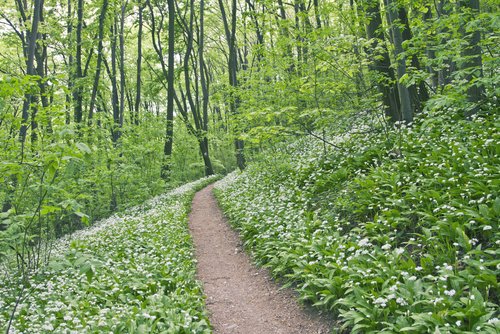Qing Qi; Heavenly Qi
Spring is on our heels and that is a great time to discuss a little Qing Qi. Qing qi translates as heavenly qi and is also called “pure qi”. It is that which is magical in the trees, the fresh air, derived from the sun and the sounds of nature landing in our ears. We are natural beings- natural and being. And we spend most of our lives forgetting that. Spring is perhaps one of the most powerful seasons to help us check in and grab a little more of these notions as we are coming off of the contraction and cold seasons of winter. We are literally ready to spring forth.Outside is where you will find the best Qing Qi. Qing qi is a specific type of qi and all living creatures need it. In Chinese medicine Qing Qi cleans the lungs and our lungs are in charge of clear skin, healthy immunity, cardiac health, proper digestion, and simple quality of life. Like grandmas sheets hung out to dry on the clothes line, you will feel better, lighter, and fresher getting outside. Qing Qi will give you a clearer head and a boost in motivation.Below is a wonderful article that speaks to the science and research of how healthy it is to simply step outside, get dirty and touch the bark. For more than 20 years, scientists have been trying to determine the mechanisms by which exposure to biodiversity improves health. Japanese scientists pioneered the search when they traveled to the island of Yakushima, famous for its biodiversity.The Japanese already had a name for the experience of well-being in nature: shinrin-yoku or “forest bathing”.We do know that a diverse ecosystem supports a varied and beneficial microbial community living around and inside us.We also know that exposure to green space, even within urban environments, increases our physical and mental well-being. But what are the mechanisms?
For more than 20 years, scientists have been trying to determine the mechanisms by which exposure to biodiversity improves health. Japanese scientists pioneered the search when they traveled to the island of Yakushima, famous for its biodiversity.The Japanese already had a name for the experience of well-being in nature: shinrin-yoku or “forest bathing”.We do know that a diverse ecosystem supports a varied and beneficial microbial community living around and inside us.We also know that exposure to green space, even within urban environments, increases our physical and mental well-being. But what are the mechanisms?
The forest air
The Japanese researchers suggested that we are taking in beneficial substances when we breathe forest air.Research has identified three major inhaled factors that can make us feel healthier. These factors are beneficial bacteria, plant-derived essential oils and negatively-charged ions.From birth to the grave, beneficial bacteria surround us; they live in the environment and, importantly, in the air we breathe. We also share almost our entire body with them. The more interaction we have with them, the happier and healthier we are.This is in part due to our gut-dwelling bacteria, which break down the food we cannot digest and produce substances that benefit us both physically and mentally.Plants and the bacteria living on them can produce essential oils to fight off harmful microorganisms. These are referred to collectively as phytoncides, literally, “plant-derived exterminators”.Research on the health benefits of plant essential oils is in its infancy. But one recent study found that a phytoncide from Korean pine trees improved the health and bacterial make-up of pigs.Notwithstanding some of the pseudoscience that gets wrapped around negative ion generating machines, there is evidence that negative air ions may influence mental outlook in beneficial ways. There are relatively higher levels of negative air ions in forested areas and close to bodies of water. This may factor into the benefits of walking in a forest or near the ocean.
More to be done
Nature-relatedness, or biophilia in which an individual feels connected to nature, has been linked with better health.But we have a long way to go before we can more fully understand the mechanisms by which an innate love of nature can benefit our health. An important part of this discussion – an overlooked one in our opinion – is further understanding of an individual’s connection to nature.In the World Health Organization report Connecting Global Priorities – Biodiversity and Human Health, released in December last year, it was concluded that:
Considering ‘microbial diversity’ as an ecosystem service provider may contribute to bridging the chasm between ecology and medicine/immunology [… ] the relationships our individual bodies have with our microbiomes are a microcosm for the vital relationships our species shares with countless other organisms with which we share the planet.
For the full article: http://theconversation.com/why-a-walk-in-the-woods-really-does-help-your-body-and-your-soul-53227
